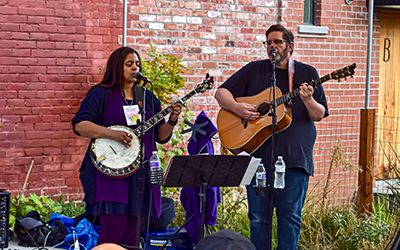 | What Faith Communities Can DoParents and children can benefit from the fellowship, support and stability offered by faith communities.Fellowship is an integral component of faith communities—and for individuals experiencing domestic violence and neglect, fellowship is one of the things they need most. By design and tradition, faith communities encourage connection and regular interaction while offering emotional and spiritual guidance and support for members. |

Listen and Connect
Look for ways that you can help others in your faith community. Reach out to and engage newly joined families and be sure to welcome and talk to children in your place of worship. Making new friends and connections can be hard for adults, so try to find ways to include and support new families and connect them with resources and information about your faith group.

Help
There are many things you can do to help families and children in need of support within your faith community:
- Ensure that individuals responsible for teaching or looking after children are trained to recognize, prevent and respond to potential child abuse and neglect.
- Get to know parents and children at your place of worship and let them know you are there for them. Once you know a family, offer to babysit so that the parents can enjoy a night off.
- Bring dinner to families experiencing significant life changes like illness, bereavement or the birth of a baby.
- Talk to your faith leader about ways you can help others at your place of worship. They may have a better understanding of the needs of your congregation.
- Give teens a safe place to be by starting a youth group or social event and advocate for youth leaders to teach about healthy relationships and sexuality. Youth-centric curriculum like Our Whole Lives “helps participants make informed and responsible decisions about their relationships, health and behavior in the context of their faith.”1
- Recognize that parenting can be a challenge. Coordinate opportunities for parents to learn and commiserate with a parenting class like Circle of Security or Conscious Discipline.
- Coordinate with members of your faith group to set up a drive for food or other donations to help families in need of basic necessities.

Participate
Getting involved in your community is an excellent way to give back while joining forces with other faith communities and businesses for a good cause. Here are a few ideas:
- Find out about and sign up for volunteer opportunities through United Way.
- Volunteer as a tutor or a mentor with Big Brothers, Big Sisters.
- In April, recognize Child Abuse Prevention Month by planting “gardens” of blue pinwheels, the symbols of a safe and carefree childhood, in front of your place of worship.
- Vanessa Behan offers support for families and children in the community. Work with your faith community to become a partner organization or become a volunteer yourself.
- Host a presentation by Our kids: Our business to learn about the risk and protective factors associated with child abuse and neglect in our community.

Educate and Share
Recommend and share information and training about sexual abuse and domestic violence with leaders and other individuals at your place of worship. There are many resources available—here are some examples:
- Stewards of Children offers child sexual abuse training curriculum to empower adults through awareness and education.
- The Faith Trust Institute, a national, multifaith, multicultural education organization working to end sexual and domestic violence, offers a range of trainings and webinars.

Advocate
Join an organization that advocates for the well-being of children and families. There are many to choose from, but one local example is Our kids: Our business (OKOB). Faith communities are a valuable part of OKOB’s work because they are a natural place of support for families.

Learn
Sometimes we’re faced with situations that we don’t know how to address, and it can be hard to know how to support an individual experiencing abuse, neglect or domestic violence.
- Learn more at Lutheran Community Services or the YWCA. You can also call the National Domestic Violence Hotline at 1.800.799.7233 to get more information.
- The Rape, Abuse and Incest National Network (RAINN) also has a National Sexual Assault Hotline that you can call 24 hours a day, seven days a week at 800.656.HOPE (4673).
- Find out how to recognize signs of abuse and how to respond at One with Courage.
1“Our Whole Lives,” United Church of Christ, last accessed September 10, 2019, https://www.ucc.org/justice_se....
